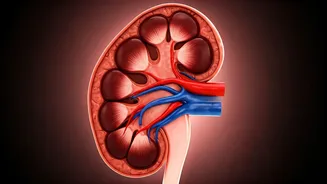Understanding Vitamin D
Vitamin D is an essential nutrient for a variety of bodily functions, including calcium absorption, bone health, and immune function. It's often called
the 'sunshine vitamin' because our bodies produce it when exposed to sunlight. Vitamin D deficiency is a common concern, leading many people to take supplements to boost their levels. However, it is essential to understand that excess intake of Vitamin D can result in a condition called Vitamin D toxicity, which is less common but can be very serious. Understanding the recommended daily intake and knowing how your body processes Vitamin D is the first step toward safeguarding your health. The aim is to achieve optimal levels without going overboard. Vitamin D plays a crucial role in maintaining overall health, so finding the right balance is paramount.
Causes of Toxicity
Vitamin D toxicity, or hypervitaminosis D, primarily occurs due to excessive intake of vitamin D supplements. Unlike getting too much vitamin D from sunlight exposure, which is hard to do as your body regulates production, supplements can easily lead to a dangerous build-up. Taking very high doses of Vitamin D supplements over a long period can cause the level of Vitamin D in your blood to become extremely high. The typical recommended daily intake of Vitamin D varies, but it generally ranges from 600 to 800 international units (IU) per day for adults. Consuming far more than this, such as 4,000 IU or higher over extended periods, increases the risk of toxicity. It's crucial to follow the advice of a healthcare provider when taking supplements to prevent any potential risks. In addition to supplementation, rare medical conditions can also contribute to vitamin D toxicity, although this is far less common.
Identifying Symptoms
The symptoms of Vitamin D toxicity can vary, but they often manifest gradually. Early symptoms may include nausea, vomiting, and loss of appetite. These are often non-specific and could be attributed to various other causes, making it essential to consider Vitamin D levels if supplements are being used. As the condition worsens, symptoms can become more severe. Significant weight loss can occur, along with frequent urination and increased thirst. Muscle weakness, bone pain, and kidney problems are also common. Furthermore, the high levels of calcium in the blood due to Vitamin D toxicity can lead to mental changes such as confusion and, in extreme cases, coma. It's important to recognize that these symptoms can indicate a serious problem, and timely medical intervention is critical for effective treatment and to prevent severe complications.
The Risks Involved
Vitamin D toxicity's most significant risk is hypercalcemia, which is elevated levels of calcium in the blood. This can lead to a cascade of health issues. Hypercalcemia can cause kidney damage, as the kidneys work hard to filter out the excess calcium. This can lead to the formation of kidney stones and, in severe cases, kidney failure. Cardiovascular problems are another major risk. High calcium levels can deposit in the arteries, increasing the risk of heart disease and other cardiovascular conditions. In addition, the increased calcium can also weaken bones, making them more prone to fractures. The accumulation of calcium in soft tissues, such as the heart and lungs, can also compromise their function. Thus, prompt diagnosis and treatment are essential to prevent severe and lasting health problems associated with Vitamin D toxicity.
Reversal and Treatment
Addressing Vitamin D toxicity usually involves several approaches. The first step is to stop taking Vitamin D supplements and any other products containing high levels of vitamin D. Healthcare providers may suggest a review of all medications and supplements being taken. Then, focus is on reducing the elevated calcium levels. This often involves intravenous fluids to increase urine production and flush out excess calcium. Medications such as corticosteroids or bisphosphonates may be prescribed to further reduce calcium levels in the blood. Closely monitoring kidney function is essential to ensure that the kidneys are not damaged. In severe cases, dialysis may be needed to support kidney function. A doctor may also recommend dietary adjustments, such as reducing calcium intake. The focus of the treatment is to get the patient back to normal levels of calcium and Vitamin D.
Safe Vitamin D Intake
Maintaining healthy Vitamin D levels safely is crucial for health. The best way to achieve this is to consult with a healthcare provider and get your Vitamin D levels checked through a blood test. They can help you determine the appropriate dosage of Vitamin D supplements. Always stick to the recommended dosage. Avoid taking more than the suggested amount unless advised by a healthcare professional. A balanced diet containing foods naturally rich in Vitamin D or fortified with Vitamin D, such as fatty fish, egg yolks, and fortified dairy products, can help support healthy levels. Regular, moderate sun exposure can also help the body produce Vitamin D naturally, but it’s important to practice sun safety. This balanced approach helps in supporting overall health and reduces the chance of Vitamin D toxicity, which helps you stay healthy.













